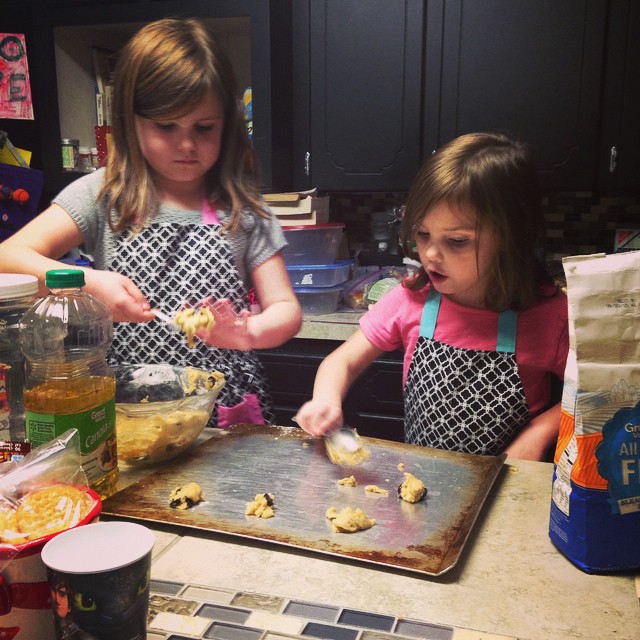
Family Life Fridays Blog
Families have changing needs, and the Extension Family Life Team is here to help!
Every Friday, Dr. Brittney Schrick, Extension Family Life Specialist, and the Family Life Team will post tips, activities, and other ideas for you and your family. Be sure to follow us on Pinterest, Instagram, and YouTube @UAEX_FamilyLife!
Kids Can...Cook!
Sometimes the thought of cooking with kids can be overwhelming. Sure, they make messes and need lots of direction, but they can also learn a lot and grow to be great cooks who contribute to the family table! Here are some tips to get your kids involved in the kitchen.
Choose developmentally appropriate tasks: Even toddlers can help if you show patience and guidance. Give them things to dump in a bowl or let them help wash fruit or veggies. Preschoolers can chop soft fruits or veggies with a butter knife, stir ingredients, count items in a recipe (We need 3 eggs!), or assemble sandwiches or other food items. Elementary age kids can do most aspects of food prep with proper training, supervision, and guidance. Kids middle school age and up can typically handle all aspects of meal planning and preparation assuming they have had some training. Younger children will need simpler tasks that require less time, and they will need to be given instructions one at a time. Older children and teens can accomplish more complex, multi-step tasks including following a recipe. It is also important to bear your child's temperament, attention span, and interests in mind.

Go into the task with realistic expectations: Online stock photos may show compliant, easily managed children with adorable flour smudges on their faces; however, that is rarely the reality of cooking with a child. Understand going in that everything will take longer, messes will be made, and the finished product will not be as perfect as it might have been if you cooked it alone. It is important to give your child the grace to make mistakes and messes, so be sure to choose times when you are not in a hurry and exactness is less important.
Provide adequate supervision and encouragement: Even when providing age appropriate tasks, be sure to watch and guide your child as they complete them. Give encouragement and feedback to help your child learn new skills. With younger children, avoid tasks that involve sharp knives, peelers, or other utensils that may cause injury as motor skills are typically not developed sufficiently to use these instruments safely. Older children and teens may use knives, peelers, and even ovens or stoves skillfully, but they should still be monitored until they have enough practice to use them safely on a consistent basis.
Benefits: Cooking with kids has lots of lasting benefits:
- Self-esteem and self-efficacy are boosted as a child learns independence and to follow through with a task.
- Math skills are gained through measuring, dividing, counting, and using temperature.
- Science skills are gained through watching and creating chemical reactions as well as observing food change through cooking.
- Reading skills are strengthened through reading packaging, instructions, and recipes
- Motor skills develop while using hands to grasp, tear, mold, stir, scoop, cut, roll, press, pinch, pour, peel, and perform any number of other actions used in food preparation, cooking, and cleaning up.
- Toddlers and preschoolers gain practice in following instructions, colors and shapes, and learn about different types of foods.
- Life skills are practiced that will allow your child to contribute to the family table and cook for themselves as they age. In addition, cleaning up after cooking helps them gain competence in household tasks like washing dishes and cleaning up messes.
- Quality family time as you interact with your child and work toward a common goal. Cooking together also gives families time to talk and hear what your child has to share and creates lifelong memories.
- Interest in and willingness to try new foods may be gained by all ages! Typically, a child (or adult) who prepares their own food will give it a try even if it's new!
Don't forget, food safety is a must! Be sure to model and encourage safe and healthy interaction with food and prep materials. Wash hands, keep hair fastened back away from food, and resist licking spoons or tasting foods with raw eggs in them. If a child (or adult) licks a spoon or other mixing utensil, be sure to put it in the sink or wash it before reusing it. Keep children away from and aware of hot surfaces and other objects that may cause harm. Be sure to cook food to the proper temperature and refrigerate perishable food right away.
For more ideas and for easy recipes, contact your county extension agent or visit:
ChopChop Magazine: http://www.chopchopmag.org/
Extension Nutrition Resources: http://uaex.uada.edu/life-skills-wellness/food-nutrition/eating-well/
Family Life Pinterest Page: https://www.pinterest.com/UAEXFamilyLife/cooking-with-kids/